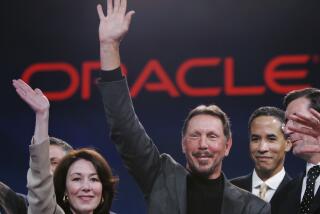The happiest board on Earth
- Share via
DELAWARE CHANCERY COURT JUDGE William B. Chandler III’s ending to Disney’s long-running corporate drama is one that only a board of directors could love. His opinion on Tuesday was the sort of script that rarely makes it to the screen these days: Rather than trying to please the crowds, it told a bitter truth.
Our story begins when Michael Eisner, Disney’s chairman and chief executive, hired his longtime pal, Michael Ovitz, a preeminent Hollywood agent and a founding partner of Creative Artists Agency, to be president of Walt Disney Co. in 1995. But the move was a spectacular failure, and Eisner pushed Ovitz out the door 15 months later. Ovitz left with a shrunken reputation but an outsized severance package: cash and stock options worth $130 million.
Shareholders soon sued, arguing that Eisner and other members of the Disney board had breached their duty to investors. Chandler rejected these claims, ruling that the board had neither acted in bad faith nor been grossly negligent. Although that’s the legal equivalent of praising with faint damns, it was enough to get the board off the hook.
And that’s the right standard. Shareholders can’t expect the courts to bail them out when management makes a bad decision. All they can expect is for the courts to make sure top managers and directors carefully and faithfully carry out their duties, including the duty to be well informed before they sign away large chunks of the corporate treasury.
Chandler found that the Disney board met those expectations. But he also found plenty to criticize in the Magic Kingdom’s management. Ovitz’s tenure “was more ‘woulda, coulda, shoulda’ than actual success,” largely because of differences with Eisner, Chandler wrote. The “Machiavellian” and “imperial” Eisner stacked the board with friends and acquaintances who “were certainly more willing to accede to his wishes and support him unconditionally than truly independent directors.”
Sure, the Disney tale ended badly for investors, and it’s not hard to see why. In hindsight, the self-important Ovitz, who was often called the “most powerful man in Hollywood,” was a bad fit for a No. 2 job. Yet Ovitz was also known as the consummate dealmaker, someone who reshaped the motion picture business by assembling packages of talent for a project. The decision to hire him is most charitably seen as a high-risk gamble with the potential for high rewards.
Where Eisner and his compliant board members went wrong was in structuring Ovitz’s contract in a way that pushed every ounce of risk onto Disney and its shareholders. The five-year deal made sure Ovitz couldn’t be denied virtually the full value of the contract no matter how poorly the company performed or how profligate he was with Disney’s dollars.
That kind of “downside protection” was central to getting Ovitz to leave CAA for Disney, and it’s endemic to the Hollywood way of doing business. Risks are routinely insured with millions of dollars in other people’s money -- not by unwitting boards and chief executives, but by boards and chief executives who think that’s just the cost of doing business.
The Securities and Exchange Commission should make it easier for investors who don’t like that kind of behavior to replace supine board members with their own nominees. Former SEC Chairman William H. Donaldson backed a proposal to help large, longtime shareholders promote their choices for boards; the corporate lobby vigorously opposed the proposal, and there is no indication how it will fare under the commission’s new chief, Christopher Cox. Meanwhile, investors can always take their money to companies with more reasonable executive pay and more independent boards.
Other corporate leaders should not view Chandler’s ruling as a free pass. His 174-page opinion repeatedly stressed the duty of directors to know what they’re voting on and to act with company’s interests foremost in their minds. And he pointedly noted that were he allowed to apply “21st century notions of best practices” in the case -- in other words, if shareholders had filed suit after the enactment of the Sarbanes-Oxley corporate accountability law -- the result might have been different.
At any rate, as the Eisner-Ovitz saga shows, shareholders have other ways of meting out punishment to chief executives and directors who blunder. A shareholder revolt forced Eisner to give up his post as chairman in March 2004, and simmering discontent hastened his departure as chief executive.
The last laugh goes to Disney investors who sold their shares the day Ovitz left the company. Over the course of his 15 months as president, Disney shares rose 27% -- hardly a bad return, even if it was merely representative of a performance that began before Ovitz arrived and continued after he departed.
More to Read
The biggest entertainment stories
Get our big stories about Hollywood, film, television, music, arts, culture and more right in your inbox as soon as they publish.
You may occasionally receive promotional content from the Los Angeles Times.










